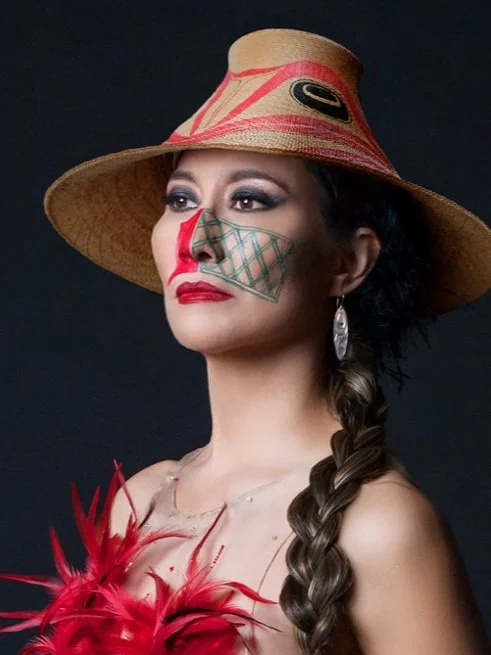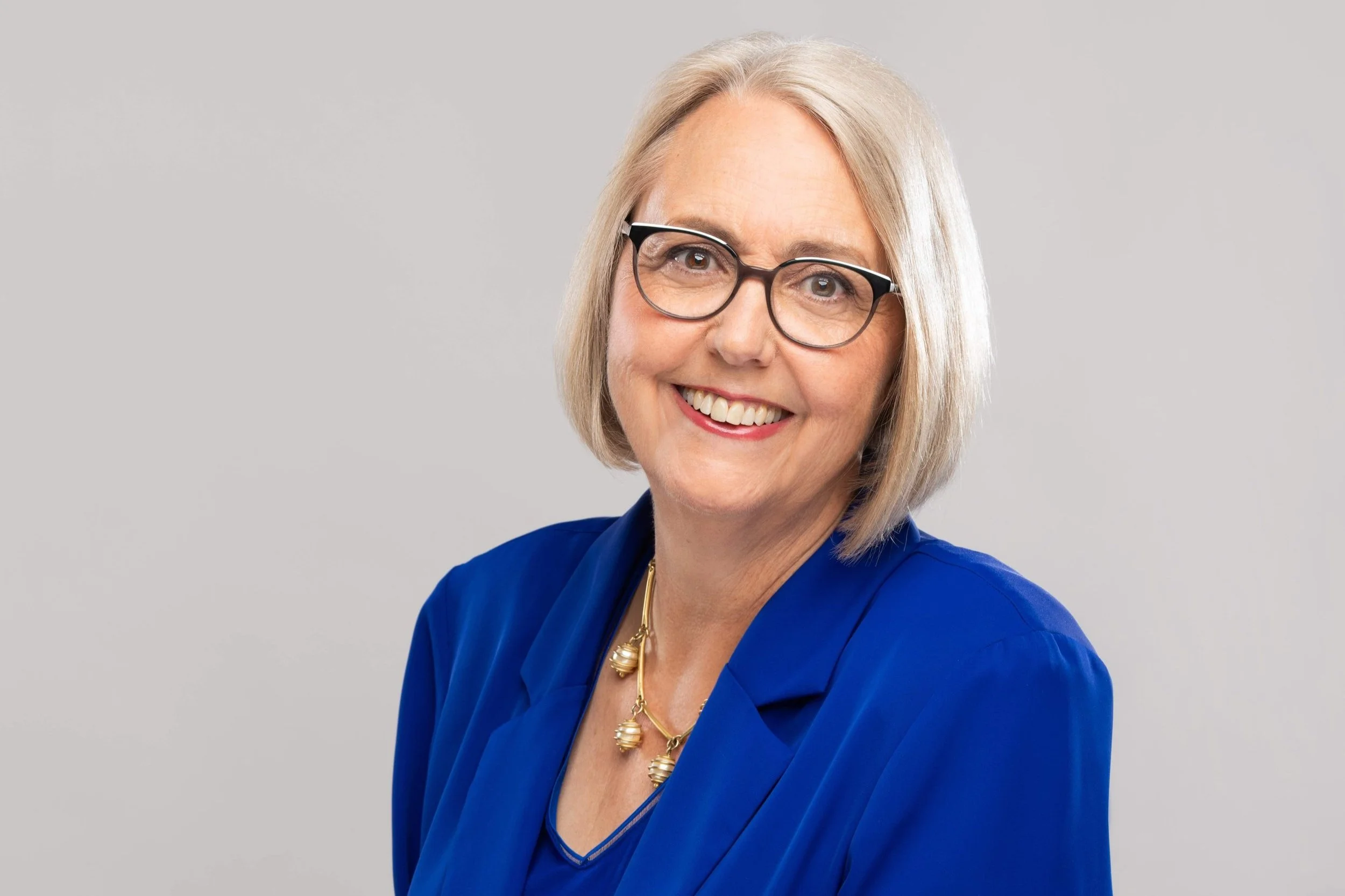Haida Gwaii shapes the innovative sounds of SGaanaGwa at the Vancouver Folk Music Festival
Artist-activist Terri-Lynn Williams-Davidson brings living traditions to the folk, rock, and jazz influences of Chilliwack founders
SGaanaGwa features Claire Lawrence, Saffron Henderson, Camille Henderson, Terri-Lynn Williams-Davidson, Jodi Proznik and Bill Henderson. Photo by Farah Nosh
SGaanaGwa plays the Vancouver Folk Music Festival Main Stage on July 17.
LISTEN CLOSE, and you can hear the rhythm of the Pacific rollers that break on the rugged west coast of Haida Gwaii, and the soughing of the winds that produce those waves. Listen closer, and you can trace the contours of the hills that overlook SG̱ang Gwaay Llanagaay, or Red Cod Island. (Some of you might also know it as the UNESCO World Heritage Site Ninstints, a once-thriving village that is still home to an awe-inspiring collection of carved totem poles.) Turn it up, and you’ll even hear some of Haida Gwaii’s indigenous birds, like the berry-loving passerine that gave its name to “Swainson’s Thrush”, one of the loveliest songs on Terri-Lynn Williams-Davidson’s 2017 album Grizzly Bear Town.
Set to ringing electric guitar and spiralling flute, it’s a meditative ode to the deep peacefulness of Haida Gwaii’s old-growth forests, and to one of Williams-Davidson’s favourite birds.
“Swainson’s thrush, as you may know, is a little bird that people on the coast call the salmonberry bird, because we believe that every time it lets out a call a salmonberry ripens,” the Haida artist, lawyer, and activist explains in a Zoom call from her island home. Online, she’s soon joined by her accompanists on Grizzly Bear Town, guitarist Bill Henderson and flute and saxophone player Claire Lawrence, founding members of the enduring West Coast rock band Chilliwack.
The three are happy to explain how the natural environment of Haida Gwaii shaped their music—and how the experience of collaborating on Williams-Davidson’s record led to the formation of SGaanaGwa, a truly innovative meeting between the living traditions of the Haida, the folk styles of Henderson and Lawrence’s settler ancestors, the electric power of rock music, and the improvisatory impulses of jazz.
“I think there are other Indigenous artists who are going down this path, but in a different way,” Williams-Davidson says. “First of all, music from the Northwest Coast is very different from the rest of Indigenous Canada. We don’t have a big drum, we don’t come from a pow-wow tradition. Our music carries the power of the ocean and the forest and the quietness of this place, too, so it’s a very different kind of music. And I thought that it was important for the songs, as much as possible, to maintain the traditional song structure of the Haida, even though they’ve evolved into a different thing.”
Henderson concurs, noting that while he and Lawrence are best-known as rock musicians, they’ve both had formal training in classical music and routinely work improvisation into their concerts as Chilliwack. Because of that, he says, “We’re able to listen and stay open and make contributions and feel the music changing when it wants to change. We weren’t working off assumptions that we would take this music and straighten it out and make it like our music, or anything like that. Although we contribute things, they’re very clearly from our own culture. We make no bones about it: we’re not trying to just play Haida music, but we’re playing with it. And I feel that Terri-Lynn is doing that as well.”
Williams-Davidson is of course deeply steeped in traditional song. Her maternal great-grandmother, Susan Williams, was a Haida song custodian, holding a vast store of cultural lore, and Williams-Davidson herself was one of the driving forces behind the Haida Gwaii Singers Society’s epochal two-volume, 14-CD collection of Haida songs both ancient and modern. But the singer-songwriter stresses that although SGaanaGwa’s repertoire includes traditional material, the new band’s repertoire mainly consists of her own songs, and ones by her husband, artist Robert Davidson.
“The Haida Gwaii Singers Society, I felt, was a way to fulfill my responsibility to ensure that traditional songs were being learned and kept alive by new generations,” she says. “And so I felt that once that responsibility was fulfilled I could go into a new project—and that new project is here because Bill was a sound engineer on one of the box sets.”
An early trio appearance at a fundraising concert made it clear that SGaanaGwa had to be a band, and with the addition of Henderson’s vocalist daughters Saffron and Camille, along with acclaimed jazz bassist Jodi Proznick, the group fell into place—as did its raison d'être.
Terri-Lynn Williams-Davidson.
“I did have sort of a broad intention, and that was to write music about female supernatural beings,” says Williams-Davidson, who has already explored that area in her stunning collection of photo-montages, Out of Concealment: Female Supernatural Beings of Haida Gwaii, and a children’s book, Magical Beings of Haida Gwaii. “‘Cedar Sister’ and ‘Foam Woman’ and ‘Landslide Lady’ are all about bringing out these supernatural beings that I’ve been studying and learning more about that have been suppressed through colonial culture. I felt it was important to express those beings in the music, and so they’re there.
“And the landscape, at least in the Haida worldview, is a supernatural landscape,” she continues. “There are supernatural beings that became certain mountains and became reefs under the ocean. And I love this idea of the supernatural beings being here with us all the time and seeing the evolution of humanity over the centuries, and that they’re still here, supporting us to take the next step for the best of all humanity—to take better care of the land and sea.”
All three agree that recording part of Grizzly Bear Town on SG̱ang Gwaay Llanagaay helped solidify their musical bond.
“The experience of recording those songs in Gwaii Haanas was incredible, and I don’t believe we would have had anything near as moving if we hadn’t recorded them there,” Lawrence says. “Being in that place really had an effect on how we played.”
“We felt that there was a strong spirit in that area, and I do believe it came through,” Henderson agrees. “I’d like to think that, anyway. It felt that way.”
“We are supernatural beings having a human experience,” Williams-Davidson adds, laughing and quoting her husband. And isn’t that what music is all about?















